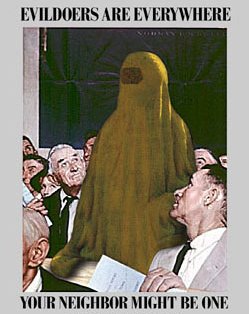Tuesday, February 28, 2006
Cloak-Tonic-Fig Leaf

"Why of course the people don't want war. Why should some poor slob on a farm want to risk his life in a war when the best he can get out of it is to come back to his farm in one piece? Naturally the common people don't want war neither in Russia, nor in England, nor for that matter in Germany. That is understood. But, after all, it is the leaders of the country who determine the policy and it is always a simple matter to drag the people along, whether it is a democracy, or a fascist dictatorship, or a parliament, or a communist dictatorship. Voice or no voice, the people can always be brought to the bidding of the leaders. That is easy. All you have to do is tell them they are being attacked, and denounce the peacemakers for lack of patriotism and exposing the country to danger. It works the same in any country." - Hermann Goering
That was the 1930's. Has anything changed? People's Daily carries an article titled "The Evolving Us Anti-Terror Strategy" It is stolen and reproduced in entirety here.
US Defense Secretary Donald Rumsfeld recently signed a new confidential anti-terror document. Judging from what's already known, the US anti-terror strategy hasn't changed much, only for the first time recognized the possible negative impacts of military operations in this regard and asked for more understanding of local culture and religion. This reflects the US embarrassment in its anti-terror strategy.
More than 30 new al-Qaeda branches have appeared ever since the "September 11", the Pentagon says. According to a recent report by Swedish paper Svenska Dagbladet, the black list the US distributed to its airport security staff for checking terror suspects has lengthened from 16 names before the "September 11" to today's 80,000, a stunning growth that fully testifies the "more anti-terror, more terror" theory.
A review of the different versions of US anti-terror strategy published shows nothing wise apart from the habitual reliance on hi-tech weapons and military force. The significance of fighting terrorism, however, seems lying in more on pressing forward the US global strategy and in domestic political strife. In fact, the Bush administration has not only put terror combat a long-term strategic goal and arduous task, but cultivated it into so huge a political capital as to create a subject called "anti-terror politics".
Terror fight has become a golden signboard or a "cloak" under which the Bush administration seeks for strategic advantages globally. It is obviously the top option to rally domestic support and beat off international criticism whether for launching wars in Afghanistan and Iraq, building new overseas military bases and reshuffling global military deployment, or promoting US-style democracy in other countries or even for handling the escalating Iranian nuclear crisis.
Terror combat, for the Bush administration, is also the best political "tonic" when it comes to party strife and public support.
A high approval rating is simply easy as long as one talks glibly about terrorist dangers. This was brought into full play in the presidential campaign at the end of 2004, when George W. Bush won his second term by holding high the anti-terror banner and beat back all kinds of attempts by the Democrats.
What's more, anti-terror efforts naturally served as a fig leaf when the government was dogged by scandals including "fabricated information" in launching the Iraqi war, the "leakage of CIA worker identity", the "abuse of detainees", the "secret prisons on foreign land" and the "eavesdropping" on international phone calls. Bush claimed in early February that al-Qaeda once schemed in October 2001 to attack a building of Bank of America in Los Angeles, but America successfully frustrated the plan.
Bush's dishing out of the terrorist attempt four years later, some media analyzed, is simply out of two considerations. First, to quash strong doubts stirred up by the "eavesdropping" scandal and justify government behavior; second, to guide public opinion so as to fish for political capital for his Republican Party at the mid-term elections in this November.
What else would be left for the US, on top of embarrassment, when the country has reduced its anti-terror strategy into a "cloak", "tonic" and "fig leaf"?

